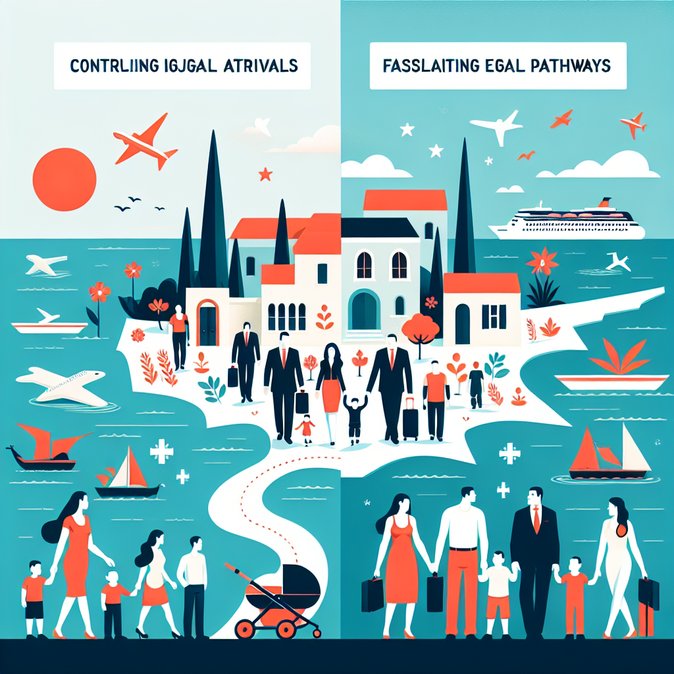
Eurostat’s latest release on residence-permit statistics places Cyprus in the European spotlight for the second year running. According to the data, published on 22 November, the Republic issued 3,379 first-time residence permits per 100,000 children under 18 in 2024— the second-highest rate in the European Union after Malta. In absolute numbers the island approved 4,802 permits for minors, a modest figure by continental standards but sizeable for a country with just 1.2 million inhabitants. The bulk of the permits (around two-thirds) were granted under the family-reunification track, reflecting Cyprus’ role as a destination for economic migrants who later bring spouses and children to the island. A further 30 per cent were issued on humanitarian grounds, with Syrian, Moroccan and Ukrainian children topping the beneficiary list. Education-related permits accounted for only four per cent.
Behind the headline, officials at the Deputy Ministry of Migration and International Protection say the numbers confirm a pivot in national policy toward “controlled but compassionate” migration. Since the 2023 overhaul of asylum procedures, the government has focused on reducing irregular arrivals—down 89 per cent since 2022—while speeding up legal channels for families of legally-resident third-country nationals. The ministry’s family-reunification service has been digitised and its staffing doubled; average processing time has fallen from nine months to just under four.
![Cyprus Ranks Second-Highest in EU for Residence Permits Issued to Non-EU Minors]()
For employers the trend has practical implications. Family-friendly migration rules make Cyprus more attractive to skilled third-country professionals, particularly in ICT, maritime services and pharmaceuticals—sectors identified by the Labour Ministry as experiencing structural shortages. Companies that sponsor highly-skilled staff through the new EU Blue Card programme note that swift family reunification is a decisive factor in convincing talent to relocate.
NGOs have welcomed the statistical milestone but urge parallel investment in integration. "Getting the permit is only step one," says Maria Ioannou of the NGO Hope for Children, pointing to shortages of places in Greek-language classes for migrant youngsters and patchy access to health insurance. Government officials counter that an integration strategy—budgeted at €32 million—is due for Cabinet approval in December.
Looking ahead, the Deputy Ministry plans to publish quarterly dashboards that break down residence-permit data by age, nationality and purpose. Businesses engaged in global mobility and relocation services should watch these releases closely; they will provide an early indicator of how Cyprus’ labour pool and consumer demographics are shifting—and where further HR support services may be needed.
Behind the headline, officials at the Deputy Ministry of Migration and International Protection say the numbers confirm a pivot in national policy toward “controlled but compassionate” migration. Since the 2023 overhaul of asylum procedures, the government has focused on reducing irregular arrivals—down 89 per cent since 2022—while speeding up legal channels for families of legally-resident third-country nationals. The ministry’s family-reunification service has been digitised and its staffing doubled; average processing time has fallen from nine months to just under four.

For employers the trend has practical implications. Family-friendly migration rules make Cyprus more attractive to skilled third-country professionals, particularly in ICT, maritime services and pharmaceuticals—sectors identified by the Labour Ministry as experiencing structural shortages. Companies that sponsor highly-skilled staff through the new EU Blue Card programme note that swift family reunification is a decisive factor in convincing talent to relocate.
NGOs have welcomed the statistical milestone but urge parallel investment in integration. "Getting the permit is only step one," says Maria Ioannou of the NGO Hope for Children, pointing to shortages of places in Greek-language classes for migrant youngsters and patchy access to health insurance. Government officials counter that an integration strategy—budgeted at €32 million—is due for Cabinet approval in December.
Looking ahead, the Deputy Ministry plans to publish quarterly dashboards that break down residence-permit data by age, nationality and purpose. Businesses engaged in global mobility and relocation services should watch these releases closely; they will provide an early indicator of how Cyprus’ labour pool and consumer demographics are shifting—and where further HR support services may be needed.









